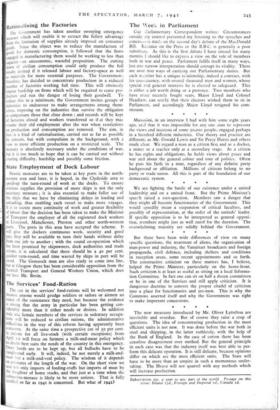Rationalising the Factories The Govemment has taken another sweeping emergency
measure which will enable it to extract the fullest advantage from the limitation of supplies already imposed on consumer goods. Since the object was to reduce the manufacture of goods for domestic consumption, it followed that the firms engaged in manufacturing them would be working to less than capacity—an uneconomic, wasteful proposition. The cutting down of civilian consumption could only produce the full results desired if it released labour and factory-space as well as materials for more essential purposes. The Government, therefore, has decided to concentrate production in a reduced number of factories working full time. This will obviously impose hardship on firms which will be required to cease pro- duction and run the danger of losing their goodwill. To reduce this to a minimum, the Government invites groups of industries to endeavour to make arrangements among them- selves, imposing on the industries that survive the obligation to compensate those that close down ; and records will be kept of factories closed and workers transferred so ti at they may resume their old employment after the war when restrictions on production and consumption are removed. The aim, in fact, is a kind of rationalisation, carried out as far as possible by consent, but with compulsion in the background, with a view to more efficient production on a restricted scale. The measure is absolutely necessary under the conditions of war, but it is too much to hope that it can be carried out without creating difficulty, hardship and possibly some friction.






























 Previous page
Previous page